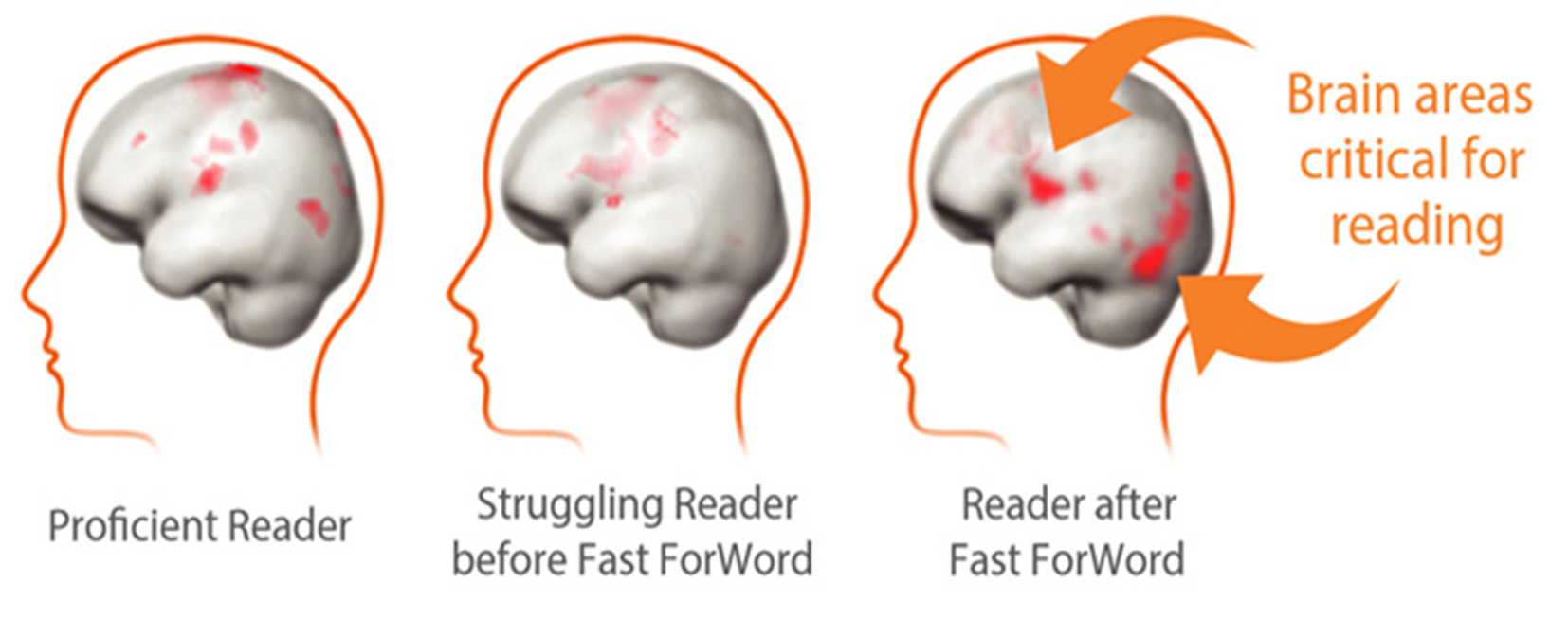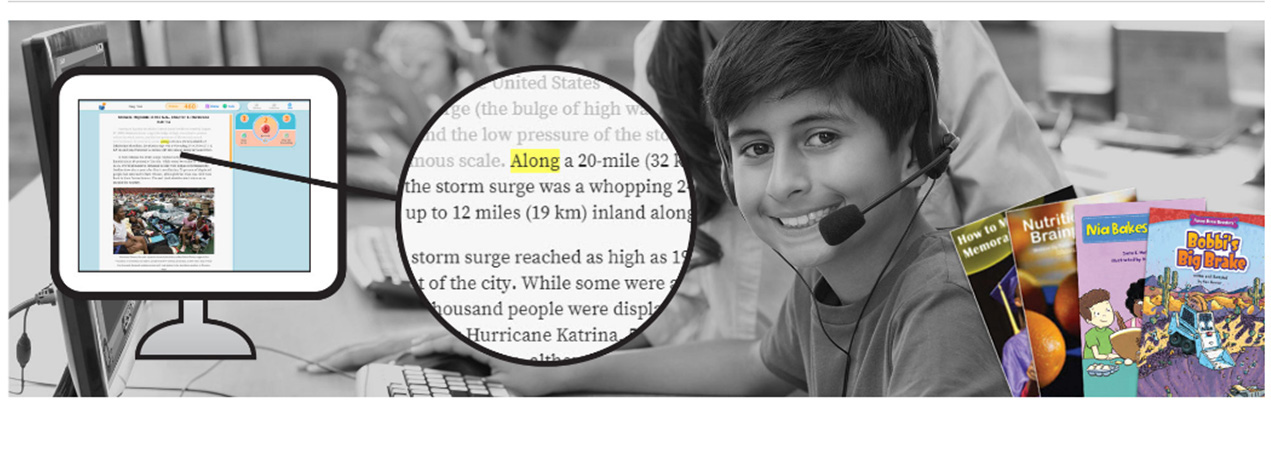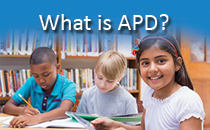The ability to read starts with how the brain perceives and processes sound.

More than 30 years of research show that weak auditory processing is at the core of most reading struggles. Reading is not something that the brain does naturally–it’s a system we’ve created that’s based on our language system in the brain.
Fast ForWord is an online intervention program developed by neuroscientists that directly targets the underlying causes of language and reading difficulty. Fast ForWord uses patented technology to work the auditory pathways to retrain the brain to process speech sounds accurately and efficiently in order to make rapid and permanent improvements in language and reading. The exercises play like video games to improve the fundamental cognitive skills of memory, attention, auditory processing, and sequencing, while simultaneously developing English grammar and reading skills. By strengthening the key pathways in the brain that help children learn, Fast ForWord enables the child to pay closer attention to their teachers, absorb information faster, and remember what they are taught.
With Fast ForWord students can achieve 1-2 years of reading gains in just 40-60 hours. No other reading and language intervention program has been as thoroughly researched and reviewed as Fast ForWord. The program has more than 55 patents in neuroscience and education and more than 250 research studies verifying its effectiveness. Fast ForWord is an evidence-based program backed by independent research that has been and continues to be published in peer-reviewed journals to substantiate its underlying science and results.
Why does Fast ForWord work so well?
Fast ForWord treats the fundamental cause of temporal (timing) processing disorders. Many children with auditory processing disorder, dyslexia, and language delays have a weakness in auditory temporal processing (the ability to perceive the rapidly changing acoustic features of speech). Problems hearing subtle differences in speech sounds often leads to difficulty with reading and can contribute to delays in language development. Often the auditory neurons in the brains of struggling readers do not fire at a fast enough rate to allow the child to hear the first part of a sound and process the rapidly changing acoustic features of speech. This affects the child’s ability to process a sequence of auditory stimuli and subtle timing cues. If a child cannot hear the first few milliseconds of a speech sound, many sounds will sound alike. The child will have difficulty discriminating the fast sounds of speech (such as recognizing voiced and voiceless sound distinctions in the words “big” and “pig” or subtle differences in where the sounds are made such as “big” and “dig”). It will be hard to distinguish when one sound ends and another begins. The child may not be able to hear all the sounds in blends or be able to determine which sound came first (such as being able to perceive the “t” prior to the “s” in the word “fits” rather than “fist”). This skill, called temporal processing, is an important skill that must be mastered for success in reading and spelling and to perceive an intact auditory message.
Fast ForWord is designed to treat the underlying neuroprocessing impairment by helping the brain reorganize itself and form new neural connections. Since aspects of our brain are changeable or “plastic,” auditory neural pathways and synapses in the brain change as a result of the sensory input and intensive training (called neuroplasticity). In the Fast ForWord Foundations/Literacy program the speech sounds, words, and sentences used in the games have been acoustically altered to stretch and emphasize the rapidly changing phonetic elements within natural speech. Users must discriminate between paired sounds, syllables or words, such as choosing which sound rose or dropped in pitch or which picture represents the word they just heard, when presented with words that sound very much alike (such as knee vs me). This helps retrain the sound representation in the brain and improves processing speed. Exercises adapt to each child’s performance providing precise and efficient training optimized for each individual’s needs. As the learner makes progress, speech is eventually returned to a normal rate. Once the child improves the auditory processing and cognitive skills associated with his/her reading struggle, Fast ForWord delivers personalized, intensive practice across a wide range of language and reading tasks to help children make rapid improvement that continues long after they are finished with the program.
fMRI (functional magnetic resonance imaging) scans show pictures of brain activity with physiological changes in the brain after just 8 weeks of using Fast ForWord. Independent researchers at Stanford and Harvard found that brains of struggling readers become more like those of typical readers after they use Fast ForWord. After 8 weeks of Fast ForWord, actual physiological changes in the brain were seen on fMRI data. Students showed increased activation in brain areas critical for reading, resembling the brain activity of proficient readers.
Fast ForWord exercises develop critical brain processing efficiency in four key areas:
- Improves memory by having the student hold a statement or question in working memory while retrieving picture-concept associations from long-term memory. For success in school, it is critical that a child be able to hold information and ideas short and long-term for word recognition, comprehension of complex sentences, and remembering instructions or information.
- Improves attention by developing the ability to focus on multiple tasks and ignore distractions.
- Strengthens auditory and linguistic processing rates so that students can distinguish sounds quickly enough to discriminate individual phonemes and understand words and sentences. It is critical for a child to be able to process incoming information quickly (through written words and spoken language), as well as quickly recall information (related to working memory).
- Develops sequencing skills so the child can determine, recognize, and remember order. Exercises require the use of a logical word order to comprehend simple and complex instructions. The child must also organize their response with the correct sequence of actions. This is an important skill to be able to sequence letters within words or sentences within paragraphs and follow multi-step directions.
Fast ForWord can facilitate a child’s progress with dyslexia therapy
Fast ForWord can be a very helpful supplement to facilitate a child’s progress in dyslexia therapy. Research shows that 70% of children with dyslexia have an underlying auditory processing disorder (APD). Although there are different types of APD, poor temporal (timing) processing skills are very common in children with dyslexia. Temporal processing is an important skill that must be mastered for success in reading and spelling and to perceive an intact auditory message. However, we do not recommend using Fast ForWord as a stand-alone program for dyslexia. A child with dyslexia also needs an intensive dyslexia therapy using a multisensory Orton Gillingham based program that breaks the language down and teaches the reader to decode based on syllable types and spelling rules. When combined with dyslexia therapy, Fast ForWord can help accelerate learning to read by helping children learn to hear and process sounds correctly and efficiently.
Reading Assistant Plus, an online guided reading tool using patented speech recognition technology to deliver real-time corrective guided reading feedback
Fast ForWord and Reading Assistant Plus can be used at the same time to provide a comprehensive solution for reading struggles to improve vocabulary, fluency comprehension, and prosody. Reading Assistant Plus is an online innovative guided reading tool using patented technology that listens as each word is read aloud and delivers immediate support to help learners whenever they struggle or mispronounce a word — reinforcing newly learned reading skills, vocabulary, and fluency. It’s like having a personal guided reading tutor that enables learners to self-correct as they are reading aloud. Reading Assistant Plus contains reading selections for a variety of interests and reading levels along with frequent comprehension checks and automatic calculation of words correct per minute. It pre-teaches academic vocabulary and provides pronunciations for new words before learners begin each e-book passage. Comprehension and vocabulary reports make it easy to track reading levels and identify specific areas of strengths and weaknesses. Learn more about Reading Assistant Plus.
Fast ForWord service package options
Fast ForWord requires professional oversight and is managed and monitored on site at Auditory Processing Center while exercises are implemented off-site (typically five days a week) through a computer or iPad with an internet connection. The quality of the support a child receives is vital to maximize the effectiveness of each game. At Auditory Processing Center, if Fast ForWord is recommended, it is only part of comprehensive therapy services for auditory processing disorder. Ongoing support is provided through Auditory Processing Center throughout the child’s participation in the Fast ForWord Program. This enables us to serve as a personal trainer to ensure that each child’s individual needs are met for any areas he/she may be struggling with. This is essential for the child to make the maximum amount of progress in the shortest amount of time possible.
We offer a free 3-Day trial and different service packages based on each child’s needs. Included in the program are weekly or biweekly progress reports, detailed, individualized feedback with additional tips and strategies to facilitate progress in any of the activities the child is struggling with, and extra help sessions when needed. We often work with students virtually, and since we specialize in auditory processing disorder, we frequently provide Fast ForWord services nationwide. For more information on Fast ForWord and our service packages contact us at 601-488-4189 or info@auditorycenter.com.





